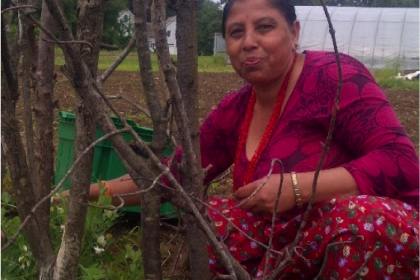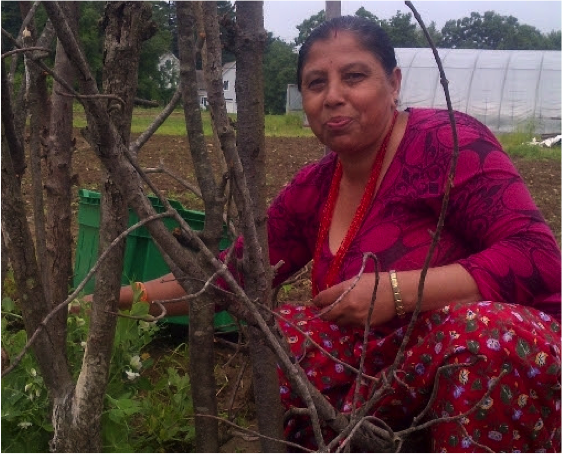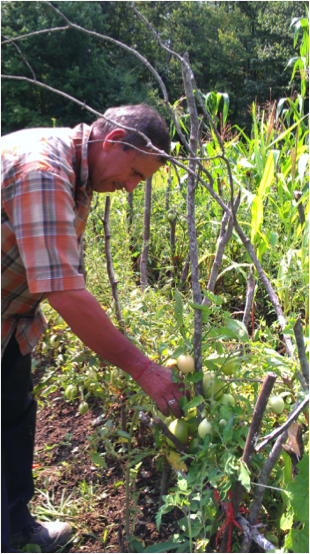
Food is the great uniter, capable of permeating and perpetuating culture and tradition. These characteristics are distinct at New Lands Farm, a program of Ascentria Care Alliance located on two community farms in Central and Western Massachusetts. The program provides training and technical assistance to new Americans in producing and selling diverse and ethnic vegetables at local farmers markets, grocery stores, and through a Community Supported Agriculture (CSA) program. The refugee and immigrant farmers are provided with the tools and resources they need to become providers for their families, while participating in activities familiar to them from their country of origin, wherever that may be.
Farmers from Bhutan, Burundi, Congo, Kenya, Somalia, Tanzania, and Vietnam, speaking some 16 different languages, collaborate and communicate to ultimately create this community. They exchange advice on how best to keep the deer and rabbits away. They gift and trade vegetables native to their home countries, such as mchicha and daikon radishes, with each other. They even help to serve as translators for one another. As unique as all the farmers are, they share a commonality: their love for farming.
 Jhuma came to West Springfield in 2009, immigrating from a refugee camp in eastern Nepal. She lives with her husband, three children, mother-in-law, and sister-in-law. This is Jhuma’s fifth year with New Lands Farm, and she is growing many vegetables for her family to eat and to sell at the market. She especially enjoys growing mustard greens and hot peppers, traditional ingredients in Bhutanese cooking.
Jhuma came to West Springfield in 2009, immigrating from a refugee camp in eastern Nepal. She lives with her husband, three children, mother-in-law, and sister-in-law. This is Jhuma’s fifth year with New Lands Farm, and she is growing many vegetables for her family to eat and to sell at the market. She especially enjoys growing mustard greens and hot peppers, traditional ingredients in Bhutanese cooking.
What was life like in Bhutan?
We had a beautiful house and a lot of land. We were farmers and used to grow a lot of crops. After we harvested them, we kept half at home and then took half to market and sold them, using that money to buy sugar, salt, clothes, and other things we needed for our everyday life.
How is farming different in Massachusetts compared to where you farmed in Bhutan?
I learned to farm from my parents and older siblings, as well as from the people from my community. We grew rice, wheat, corn, mustard, barley, oats, potatoes, broccoli, cabbage, and so on. In Bhutan, we never used tractors for plowing, we used oxen. We then used to put cow’s and buffalo’s dung in our farm as fertilizer.
Why did you get involved in New Lands Farm?
I have learned so many things from this program. I never thought that I would grow my own vegetables, sell them, and make money from them. I don’t have that much land but I still grow enough vegetables for my family and enough to sell to market, too. It is such a nice experience and I enjoy working with people from many different countries.
 Like Jhuma, Tila is thriving at New Lands Farms, proving to be a talented farmer with a passion for growing crops. Tila grew up in Bhutan, eventually immigrating to Massachusetts in March of 2011. He lives with his wife and has children who love when he brings home fresh vegetables.
Like Jhuma, Tila is thriving at New Lands Farms, proving to be a talented farmer with a passion for growing crops. Tila grew up in Bhutan, eventually immigrating to Massachusetts in March of 2011. He lives with his wife and has children who love when he brings home fresh vegetables.
How did you learn to farm?
I learned from my parents and my grandparents. I was 11 years old when I started. I used to help at the farm with my parents. In Bhutan we plowed the land with oxen. I started plowing the land with oxen when I was 16. I had to do it. I needed to make land and I had no other option on my family’s plot.
What was life like in the refugee camp?
I left Bhutan for a refugee camp in Nepal when I was 45 years old. I had a very small hut and I had to stay in a very small space. Some of us had many family members. When rain and wind came we had problems–the roof came off our house. The children went to school and the adults left to work, mostly women took care of the children. We got food and vegetables but there wasn’t enough so we had to go outside to grow food for our family. There was a Nepalese village outside of the refugee camp that we would go to because we spoke the same language as the villagers. I would ask the villagers if they needed help with farming. I helped with their land so I could use some of their land to grow vegetables for my family. We didn’t get the same vegetables in the camp that we were used to eating so that is why we would go outside of the camp to grow our own.
What are you excited about for the future?
I don’t have another job. I want to continue farming as long as I’m able to. I love farming because I did the same thing in my country. I love bringing green vegetables home for my family. This is my side income. My children say I’m too old to go to the farm but I just want to grow vegetables. I’m used to it. It’s what I did In Bhutan. I give many vegetables to the CSA. I have some good, fresh vegetables. Buy vegetables from me so I will be happy!
New Lands Farm empowers Jhuma, Tila, and many others to honor their food traditions, earn supplemental income, and contribute in a meaningful way to their new community through their production and sale of local, sustainably grown produce. New Lands Farm has become a strong, multi-cultural community of farmers invested in their passion for farming. This passion has travelled with them from their native countries, to refugee camps, and now to their homes in Massachusetts.
For further information about Ascentria’s New Lands Farm program, please visit www.newlandsfarm.org. This story was written by Stephanie Hua, the 2015 Farm Intern at New Lands Farm.



